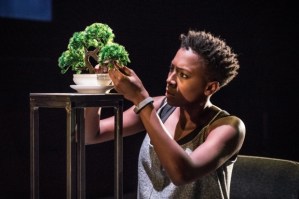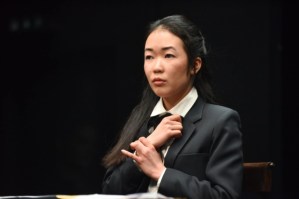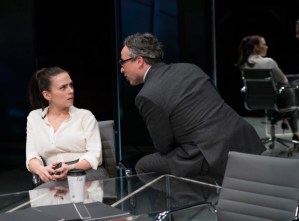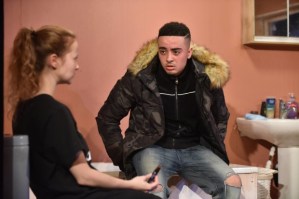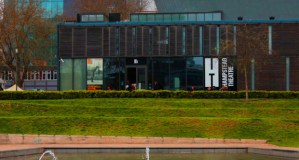Review: Describe the Night (Hampstead Theatre)
Rajiv Joseph’s show makes its UK premiere at the north London venue
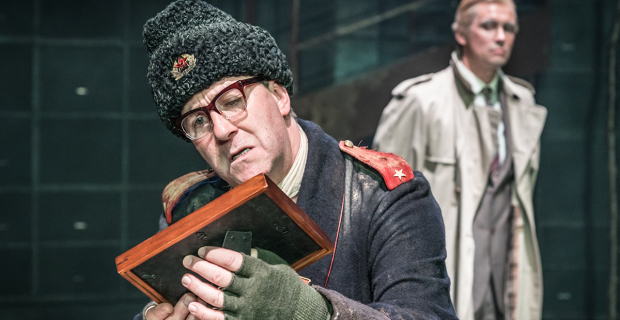
© Marc Brenner
We tend to think of Russia's "industrial scale disinformation" as a peculiarly Putin-esque invention: a way of destabilising a population, increasingly the world, with a tangle of deceit, denial and distraction. Rajiv Joseph's Describe the Night insists otherwise, framing the blur of fact and fiction as a longstanding crux of Russia's national psyche. "In our country," the dissident author Aleksandr Solzhenitsyn wrote, "the lie has become not just a moral category but a pillar of the state."
The spirit of Solzhenitsyn stalks a play that skips through a century of Soviet history in which Russia gives reality the slip. It starts in 1920 with a Jewish journalist, Isaac Emmanuilovich Babel, censored by a soldier at the height of the Polish-Soviet war – a conflict the Bolsheviks sought to cover up – and slides through Stalin's dissident purges and the waking dream state of Perestroika, all the way up to the 2010 plane crash that wiped out 96 top-ranking Poles, including president Lech Kaczynski, on their way to commemorate the Russian massacre at Smolensk – a crash so horribly coincidental that it looks like a sick joke.
It's a dazzlingly audacious epic – not just because it folds all that into one extended family history, but because Joseph dares to weave in an unmistakable proxy for Putin himself. Vova (Steve John Shepherd) is a flaxen blonde KGB agent with no sense of smell and a talent for judo sent to prevent Babel's granddaughter from escaping East Germany. It's a move that plays on subversive literature, sidestepping any censorship with deniability, while turning Putin's own propagandist tactics against him. Joseph strides into the vacuum of Putin's personal history to pass off a preposterous fiction as a possibility.
It's perfect for a play that interrogates fact and fiction. Describing the same night in war-torn Poland, David Birrell's censorious officer drops blank facts against Babel's metaphors – two conflicting truths that bind the friends together as one becomes a subversive author, the other, Stalin's chief of police. They share a lover too: Yevgenia Feigenberg, driven insane by her time in an asylum until she confuses Babel's stories for reality. His invented recipe for bloody leech soup becomes reality – dished to her granddaughter and incapacitating Russia's future president.
That Babel's front-line diary provides the connecting thread, passed between generations then prized from the plane crash at Smolensk, shows history itself as rooted in story. Long after his reports are forgotten, his allegorical fiction destroyed by Stalin's state, it's his writerly reflections that reach us today. Solzhenitsyn again: "Literature becomes the living memory of the state." It's a game Joseph's still playing today: his drama bleeds into our reading of contemporary Russia.
Theatre provides the perfect space for all this – simultaneously real and not, neither true nor false – but Joseph's script deserves far more imagination and daring than Lisa Spirling's pedestrian production provides. It cries out for either wild, anarchic surrealism or rigorous, painstaking realism, but Spirling only makes it seem stagey: neither testing our credibility nor tapping into its abandon. It all ends up feeling as Russian as a pink gin – and not just because the cast retain their own accents.
That holds back decent actors who do all that's asked of them. Shepherd has Putin's inscrutable squint down pat as Vova, but he tips into Terminator or Marvel supervillain too often. Rebecca O'Mara drolly sends up the batty frailty of the old-age Yevgenia, and Birrell shows us a soldier's underlying emotions only to let Nikolai slip into a caricature of Soviet decay. What could have been a careering, questioning thriller instead slumps into sludgy, bog-standard staginess. What a waste.




